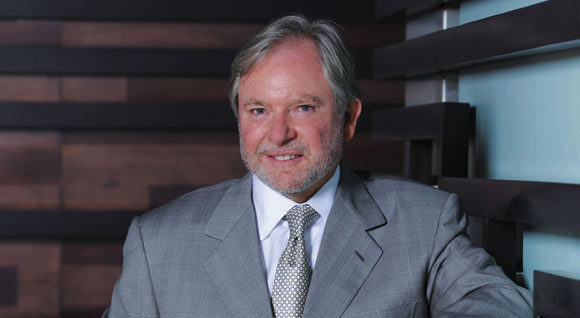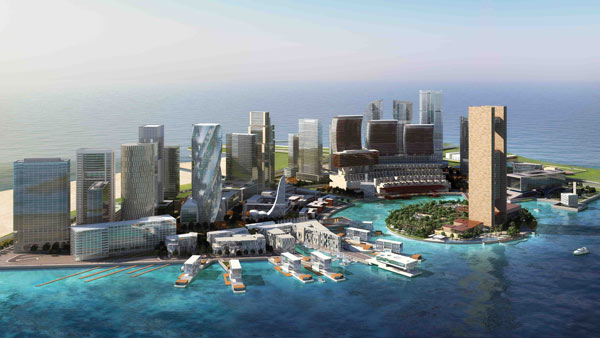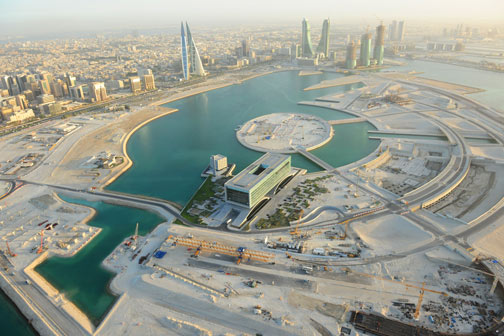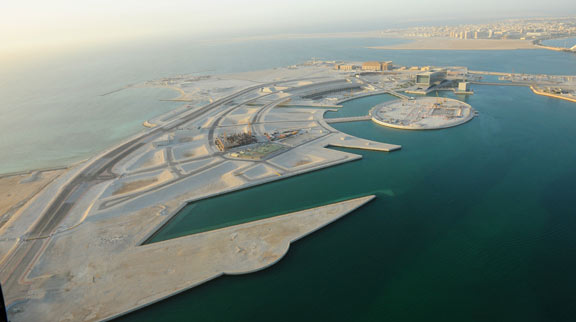Bahrain Real Estate Market Has Bottomed and Offers Investment Opportunities
Bob Vincent, CEO of Bahrain Bay
Regarding economic growth and maturity, we are at the bottom of the curve and long term investors recognise that to do business it is necessary to ride that curve. Real-estate in general goes through five, seven and even nine-year cycles, and it is not different here in Bahrain Bay.
Interview with Bob Vincent, CEO of Bahrain Bay

The Bahrain real estate sector has been hit hard by global financial concerns. The island still suffers from an oversupply of high-end accommodation, so real estate prices in the first half of this year were down by 20% while the market is expected to make a recovery in late 2011 or early 2012, according to some real-estate experts.
Regarding economic growth and maturity, we are at the bottom of the curve and long term investors recognise that to do business it is necessary to ride that curve and, despite the hiccups that occur along the way, the curve is definitely on its way up in terms of opportunity, in terms of investment and in terms of returns on that investment.
How would you describe the current climate of the Bahrain real-estate market and what was the effect of the recent unrest to the sector?
It has been a very interesting 2-year period, beginning with the commencement of the financial crisis in late 2008 right up until the recent Arab Spring. I think it is fair to say we had greater concerns and about the financial crisis than about the unrest. Largely due to people taking a long-term view of where we have been in business and where we’re going in.
Democratic change as far as economic development is concerned is occurring everywhere in the world on a daily basis, not just in the Middle-East. And despite some of the negative impacts that have come from the social outburst, the Middle-East still represents a very big investment opportunity.
We are talking about a population with a very young demographic and a very large one (320 million people in the Middle-East/North Africa region); the equivalent of Southeast Asia (Vietnam, Singapore, Malaysia, Indonesia); larger than the United-States; similar to the biggest European Markets combined. Such a demographic creates business opportunities.

Regarding economic growth and maturity, we are at the bottom of the curve and long term investors recognise that to do business it is necessary to ride that curve and, despite the hiccups that occur along the way, the curve is definitely on its way up in terms of opportunity, in terms of investment and in terms of returns on that investment.
Real-estate in general goes through five, seven and even nine-year cycles, and it is not different here in Bahrain Bay. In general success depends on when you start your project, the timing is crucial. Experienced investors try to time themselves to get the maximum opportunity.
It is fair to say that Bahrain Bay has timed itself perfectly. Shareholders of the project saw the improvement of the real-estate market coming. That allowed us to get in the real-estate market and establish our brand, our reputation, and our credibility. It also allowed us to come to the real-estate market with products that we had real passion in selling. It also allowed us to reap some of the revenues in the early stages of the project which has given us a really strong financial footing. That gives us flexibility for moving forward.
You participated at MIPIM 2011, one of the most important meetings in the business. What was the feedback from those key industry players? What were their concerns?
Bahrain is a very small real-estate market compared to the larger Middle-East markets, but it is a key real-estate market: people recognise that Bahrain is the door to the Middle-East and Bahrain has been very good to promote itself as such. That position and that reputation have been built slowly over time. Not in the last five or seven years, but over the last 40 years. So when investors start to investigate Middle-East, they begin with Bahrain. They know Bahrain has progressed in terms of democracy, they recognise that Bahrain is leading the way in terms of changes. Nobody is pretending Bahrain has reached its goals, it is still definitely evolving.
The government, the commercial industry, the private sector are all trying to push together to carry Bahrain forward towards its next goal. Investors want to know if Bahrain is still on track; if it is still committed to its infrastructure and social evolution; if it is still interested in looking at foreign investors; if it is ready to diversify its products on its markets both local, regional and international; and if the government is prepared to assist in that process. When you go down that list you can tick all those boxes for Bahrain.
Bahrain Bay is a 2.5 billion economic development. Over the last twelve months, Bahrain Bay has successfully achieved key milestones. However, do you think there is enough space for megaprojects? 
There is always space for megaprojects, it only depends how they are structured, who are the promoters and the sponsors and if they are committed, and what the major opportunity leads to. Bahrain Bay is a megaproject on a scale with the megaprojects in Bahrain, but it is not as big as other projects from other parts of the world.
However, it has been carefully masterplanned. As such it is resilient to short-term real-estate market fluctuations, it is leading-edge in terms of added value such as all infrastructure being pre-constructed, and it is well-supported by a solid proven set of shareholders. As a megaproject in Bahrain, it is very manageable. It may not be as big as other projects, but it suits very well the local context and it suits the local real-estate market.
What has been achieved for the last two years? Which stage are you in the project?
Since 2006, when we started the project, we have progressed quite some way. We have completed all of reclamation, built the quay walls, completed the main civil infrastructure works (roads, bridges, etc), and committed to the construction of the critical infrastructure. That is an important point, many developments are built either in isolation or at the fringes of urban development and they have to encourage infrastructure into their development.
In the case of Bahrain Bay, we made the commitment upfront to put all the critical utilities and services in the ground so that when investors came to site, when they purchased their land, they had certainty in terms of connectivity with roads and physical infrastructures (sewers, water, etc.) all embedded in the project as well as the highest IT connectivity in the ground, ready to capitalise on their investments immediately.
We have completed all that work and sold 66 per cent of the land despite the financial crisis, and the difficulties of the real-estate market over the last 3 years. Also, we have been successful in attracting a good diversity of investors; local investors, regional investors from Kuwait, Qatar, Dubai, and international investors from Europe, India and Southeast Asia. That gives us a good platform both in terms of the diversity of capital invested in the project and in terms of a strong support in the local real-estate market, which is vital for any major project.
What kind of investors are you looking for?
Over the last two or three years, the real-estate market has changed dramatically, in terms of supply-demand ratios, in terms of takeout and momentum, in terms of cost, and in terms of demand going forward. So we need to revaluate the remaining 35 per cent of our land to be sure that we are attracting the most relevant investors possible. 
To that end, we are looking at opportunities where we may de-scale portions of the land; we are looking at attracting boutique investors as well as large investors. We are looking for those investors who recognise that they can bring a product to the real-estate market that gives them a unique positioning, not more of the same.
One of the biggest problems we have with any real-estate boom is that we get a lot of the same, not just in Bahrain, but all around the world. The reason you end up with boom-bust cycles is because you only supply one or two products in the real-estate market. As we move forward, we need to make sure that we diversify our products, that we diversify our investors and that we respond to the real demand in the local real-estate market, and that is what we are doing at the moment. We are doing it through inputs into the design criteria of our committed investors, and by explaining what the opportunities are now, for new investors.
Because there is demand for high-end unit development and a very strong demand for affordable housing and move-up housing, there is a sudden interest in hotels and tourism, and there is a more strategic development approach that is emerging, like corporate headquarters.
Are there any specific investors you are looking for in the very short term?
We want to encourage those who have currently invested to get started, because it adds value to the surrounding land, and it gives confidence to the developers who are currently there, as well as demonstrating that the investors who put their money on the table are ready to move forward. We are already seeing that support being added to by the commitment of the Four Seasons Hotels, a world renowned brand.
We have a 55-story commercial high-rise tower under construction. By the end of 2011, we will have at least two more projects under construction. We already have the commitment of Al Baraka Bank; they have signed a contractor up to start the construction of their new financial headquarters. All that taken together with the government infrastructure work taking place around us and we are looking at over a billion dollars worth of work going on today in Bahrain Bay.
Despite what many people may say regarding tough market conditions. We are proud to say that Bahrain Bay’s strategy has allowed us to continue moving forward on-time and on-program. Our third party developers and our government neighbours and partners are supporting us.
What are the challenges that still lie ahead?
Bahrain is moving, in my opinion, into a period of anticipation. How are we going to respond to the current situation? We know we cannot stand still, we know we cannot go backwards. I am very pleased with the efforts that have been undertaken by the government; we have had key discussions with ministers across the board on how they intend to address the issues (responding, planning and commitment for the future). They have taken the time to reassess the situation; they are flexible in their approach.
It is a very exciting period of innovation that is coming up. We are already hearing people talking about the opportunities of 2012 and how optimistic the outlook is if everything we are dreaming of, if all the efforts that have been made, come to fruition.
Bahrain Bay is not a two-year or three-year project, but a ten to fifteen-year project. We are only in the first 30% of that period.
How do you see yourself and the company Bahrain Bay in five years?
Bahrain Bay is not a two-year or three-year project, but a ten to fifteen-year project. We are only in the first 30% of that period. We still have five, possibly ten, years ahead of us to build out the project. The commitment from our shareholders and from our third party investors is to be a part of the success of Bahrain. They will only be successful if they work together with the other investors in the project and if they bring something new, innovative, and exciting to the real-estate market. This can’t be done over a one or two year period, it requires a commitment.
From an economic development perspective, Bahrain Bay is not just about looking for opportunities, but about leveraging those opportunities into the economy and then taking those to another level. The future is about network building, investment relationship building, government sponsorship growth, and economic stimulus across the board for the local economy.
Even though Bahrain is a small real-estate market, it is probably the most active in terms of its ability to move quickly, the most flexible in terms of its knowledge base and the educational level of its people, and it has a very strong level of commitment from the government. The people who are looking at things objectively recognise that Bahrain has proven itself over time and that it is going to be there in the future.
The fear factor has now left the real-estate market, the uncertainty has been understood. The only question that remains is: How to move forward in the most positive and secure way? And that is building up anticipation in people. There is a huge market here, there is a tremendous relationship with the rest of the region of the Middle-East/North Africa, and there is an emerging economy all around us. This is an exciting time, and I can’t wait to see what lies ahead of us.